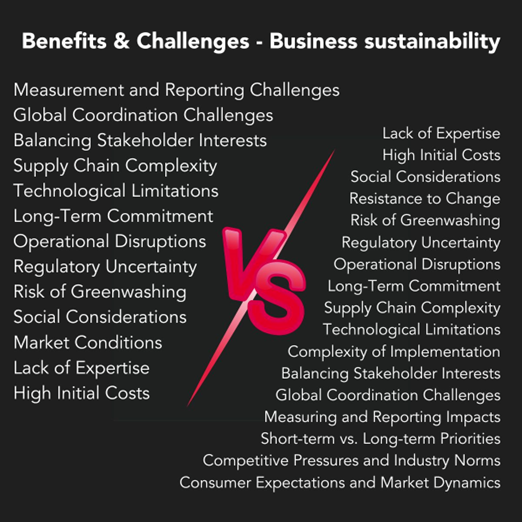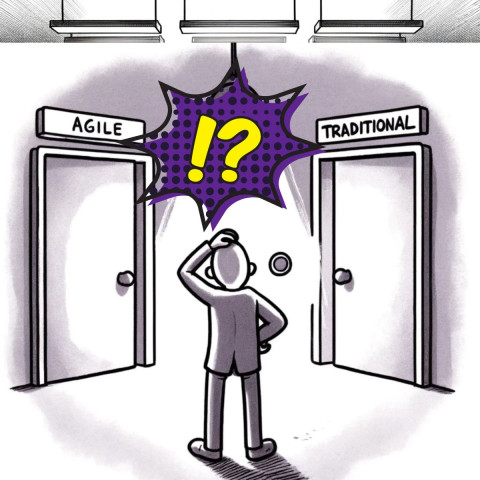Business sustainability - The benefits and challenges
Business sustainability offers a compelling pathway to long-term viability and competitive advantage by focusing on environmentally and socially responsible practices. These practices not only help preserve essential natural resources but also build trust and loyalty among consumers, increasingly attentive to corporate ethics. However, achieving sustainability is fraught with challenges, including the significant initial costs of green technologies, the complexity of transforming supply chains, and the necessity of staying agile amidst fluctuating regulatory landscapes. These obstacles require businesses to innovate continually, balancing ecological goals with economic realities to ensure both profitability and planetary health.
- The business benefits of sustainability
Business sustainability not only drives cost savings and enhances brand reputation but also fosters innovation, resilience, and positive social impact, positioning companies for long-term success in a rapidly changing world.
a. Cost savings
Sustainable practices often lead to reduced resource consumption, such as energy, water, and raw materials. By optimising processes and minimising waste, businesses can lower their operational costs over time, resulting in significant savings.
Demonstrating proactive risk management and resilience measures through sustainability initiatives can lead to lower insurance premiums. By implementing measures to mitigate environmental and social risks, businesses can reduce their exposure to insurance claims and negotiate more favourable insurance terms.
Sustainable products are often designed with durability and longevity in mind, resulting in higher-quality offerings that reduce the need for frequent replacements and repairs, ultimately leading to cost savings for both businesses and consumers.
b. Operational efficiency and productivity
Research indicates that employees working in green-certified buildings experience higher cognitive function and improved sleep quality, leading to greater daytime productivity.
Sustainable practices often streamline operations and improve workflow efficiency. By implementing measures such as lean manufacturing, renewable energy adoption, and waste reduction initiatives, businesses can enhance productivity and overall operational performance.
c. Enhanced brand reputation
Being sustainable fosters trust and loyalty among customer and stakeholders.
Consumers are increasingly conscious of environmental and social issues, and they prefer to support companies that demonstrate a commitment to sustainability. By adopting sustainable practices, businesses can differentiate themselves positively in the market, attracting more customers and building a strong brand reputation.
By conducting business in an environmentally and socially responsible manner, companies can safeguard their reputation and protect themselves from negative publicity.
DID YOU KNOW
Studies show that 83% of individuals consistently choose brands
with a stronger sustainability track record
d. Competitive advantage
Pursuing sustainability often requires innovation in product design, manufacturing processes, and business models. By investing in research and development of sustainable technologies and practices, companies can stay ahead of the competition and capture new market opportunities
In the UK, companies can apply to the Government R & D scheme and receive up to 40% of the development costs back.
https://www.gov.uk/guidance/corporation-tax-research-and-development-rd-relief
e. Risk mitigation and regulatory compliance
Sustainability initiatives help businesses anticipate and mitigate risks associated with regulatory changes, resource scarcity, and reputational damage. By complying with environmental and social regulations and proactively addressing potential issues, companies can reduce the likelihood of disruptions to their operations.
Compliance with international sustainability standards and certifications can facilitate trade relationships and partnerships with companies and organisations that prioritise ethical and sustainable business practices, opening up new opportunities for collaboration and market expansion.
f. Improved investor relations
Companies with strong green credentials are increasingly appealing to investors, with climate impact often being a key criterion when assessing suitability.
Transparency and disclosure of sustainability performance can enhance investor trust and confidence. By providing comprehensive sustainability reporting and demonstrating progress towards environmental, social, and governance goals, businesses can foster positive relationships with investors and stakeholders.
Institutional investors and asset managers increasingly integrate sustainability criteria into their investment decisions. By aligning with investor preferences and ESG criteria, businesses can attract capital from responsible investment funds and institutional investors, enhancing their financial performance and shareholder value.
g. Improved employee engagement and retention
Employees are more motivated and engaged when they work for companies that align with their values. By prioritising sustainability and providing opportunities for involvement in green initiatives, businesses can boost morale, increase productivity, and retain top talent.
Millennials and Gen Z employees increasingly seek employers that prioritise sustainability and social responsibility. By integrating sustainability into their corporate culture and values, businesses can attract top talent and maintain a competitive edge in the recruitment market.
h. Long-term resilience and adaptability
Sustainable businesses are better equipped to adapt to changing market conditions and navigate future challenges. By building resilience through resource efficiency, diversifying supply chains, and fostering stakeholder relationships, companies can thrive in a rapidly evolving business environment.
As consumer preferences evolve towards sustainability and ethical consumption, businesses that embrace sustainability can anticipate and meet changing market demands, ensuring long-term relevance and customer loyalty.
i. Enhanced disaster preparedness:
Sustainable practices, such as renewable energy adoption and water conservation measures, can improve a company's resilience to natural disasters and climate-related risks. By investing in climate adaptation and disaster preparedness, businesses can mitigate potential disruptions to their operations and supply chains.
j. Strengthened supply chain resilience
Sustainable supply chain practices, such as ethical sourcing, transparency, and supplier diversification, contribute to greater resilience against disruptions. By building responsible and robust supply chains, businesses can minimise the risk of supply shortages, price fluctuations, and reputational damage.
Achieving sustainability goals often requires collaboration and transparency across the entire supply chain. However, supply chains can be complex and fragmented, with multiple tiers of suppliers operating in different regions and jurisdictions. Ensuring ethical and sustainable sourcing, as well as monitoring supplier practices, can be challenging, particularly in industries with opaque or high-risk supply chains.
k. Positive impact on ecosystems and society
Beyond financial benefits, sustainability initiatives contribute to positive environmental and social impacts, such as biodiversity conservation, community development, and poverty alleviation. By investing in sustainability, businesses can create lasting value for ecosystems, communities, and future generations while enhancing their reputation as responsible corporate citizens.
Collaboration with suppliers, partners, and industry stakeholders on sustainability initiatives can drive innovation and knowledge sharing. By participating in sustainability-focused networks and partnerships, businesses can access new ideas, technologies, and market opportunities that fuel innovation and growth.

2. Business challenges and Considerations
Achieving either goal of reducing your carbon footprint and getting to Net Zero can pose significant challenges.
Businesses encounter challenges in sustainability due to initial investment costs, navigating regulatory complexities, and meeting evolving consumer expectations. Balancing short-term financial goals with long-term sustainability objectives remains a central challenge, along with adapting to changing market dynamics and fostering internal cultural shifts.
a. High Initial Costs
Transitioning to low-carbon technologies often requires significant upfront investment. For example, retrofitting buildings to improve energy efficiency or investing in renewable energy infrastructure can be costly.
While sustainability initiatives often yield long-term cost savings, the initial investment required can be a significant barrier for businesses, particularly small and medium-sized enterprises (SMEs) or those operating on tight budgets. Securing financing or reallocating resources to fund sustainability projects may require careful planning and prioritisation, especially when competing with other business priorities.
b. Technological Limitations
While technology for renewable energy and energy efficiency has advanced significantly, limitations still exist. Some industries do not yet have viable low-carbon alternatives for their processes, such as certain manufacturing and heavy industries.
Adopting sustainable technologies and practices often requires access to advanced tools, equipment, and expertise. Businesses may face technological barriers, such as the lack of affordable or proven green technologies, outdated infrastructure, or insufficient technical knowledge within the organisation, hindering their ability to implement effective sustainability solutions.
c. Supply Chain Complexity
Many businesses depend on complex global supply chains that are difficult to decarbonize. Convincing suppliers to adopt greener practices or finding suppliers that meet these criteria can be challenging.
Achieving sustainability goals often requires collaboration and transparency across the entire supply chain. However, supply chains can be complex and fragmented, with multiple tiers of suppliers operating in different regions and jurisdictions. Ensuring ethical and sustainable sourcing, as well as monitoring supplier practices, can be challenging, particularly in industries with opaque or high-risk supply chains.
d. Regulatory Uncertainty
Policies and regulations regarding carbon emissions can vary greatly between regions and change over time. This unpredictability can make it difficult for businesses to plan long-term investments and strategies for reducing emissions.
Regulatory requirements related to sustainability, such as emissions standards, waste management regulations, and ethical sourcing guidelines, are constantly evolving. Keeping abreast of changing regulations across different jurisdictions and ensuring compliance can be challenging, especially for multinational companies operating in multiple markets with varying legal frameworks.
e. Consumer expectations and market dynamics
Economic conditions, such as recessions, can divert resources away from sustainability initiatives. Additionally, if customers and clients are not demanding sustainable practices, there may be less business incentive to implement them.
While consumer demand for sustainable products and services is growing, businesses may face challenges in meeting evolving expectations while balancing factors such as price competitiveness, product quality, and market demand. Understanding shifting consumer preferences and effectively communicating sustainability credentials to customers are essential but can be challenging, especially in industries where sustainability is not yet a primary purchasing criterion.
f. Lack of Expertise
There is often a skills gap in organisations regarding understanding and implementing sustainability and carbon reduction strategies. Training or hiring new staff involves additional time and resources.
Lack of awareness and education: Many businesses, especially in industries with traditionally low levels of sustainability awareness, may lack a comprehensive understanding of sustainability concepts, best practices, and their relevance to their operations. Educating stakeholders, including employees, suppliers, customers, and investors, about the benefits and implications of sustainability initiatives is essential but can be time-consuming and resource-intensive.
g. Resistance to change
Implementing sustainability initiatives often requires changes in organisational culture, processes, and behaviours. Resistance to change from employees, management, or other stakeholders can pose a significant barrier to progress. Overcoming inertia and driving organisational change requires effective change management strategies, leadership commitment, and ongoing communication and engagement with stakeholders.
h. Measuring and reporting impacts
Accurately measuring a company’s carbon footprint, especially indirect emissions (Scope 3), and reporting in a transparent way can be technically complex and resource-intensive.
Calculating the environmental, social, and economic impacts of sustainability initiatives requires robust metrics, data collection systems, and reporting mechanisms. However, measuring the full extent of these impacts, especially across complex value chains, can be challenging. Additionally, reporting standards and frameworks vary, making it difficult for businesses to compare and benchmark their sustainability performance against industry peers.
Did you know?
Although 90% of business leaders think sustainability is important, only 60% of companies have a sustainability strategy. (Travel Perk.com)
i. Risk of Greenwashing
Businesses face the risk of being accused of greenwashing if their sustainability claims do not match their actions. Ensuring that claims are credible and backed by real actions is crucial but can be difficult.
Greenwashing happens when companies falsely claim to be environmentally friendly or sustainable to attract customers. They might use misleading labels or marketing to make their products seem greener than they really are. This can confuse consumers and make it harder for genuinely eco-friendly businesses to stand out. To avoid being fooled by greenwashing, it's important to look for evidence and transparency behind a company's claims, rather than just trusting their advertising.
j. Operational Disruptions
Modifying existing processes and systems for greater efficiency or lower emissions can lead to temporary disruptions in operations, which can affect productivity and profitability.
k. Competitive pressures and industry norms
In industries where sustainability practices are not yet widespread or where there is intense competition based on factors other than sustainability, businesses may face challenges in differentiating themselves based on sustainability alone. Overcoming industry norms and driving widespread adoption of sustainable practices may require collaboration and collective action within the sector, as well as innovative approaches to value creation and market positioning.
l. Complexity of implementation
Implementing sustainability initiatives involves multifaceted changes across various aspects of the organisation, including operations, supply chain management, product development, and corporate culture. Coordinating efforts across different departments or business units, as well as engaging employees and stakeholders, can present logistical and organisational challenges.
m. Balancing Stakeholder Interests
Companies must balance the interests of various stakeholders, including investors, customers, and employees. While some stakeholders strongly advocate for rapid environmental actions, others may be more concerned with traditional financial returns.
Effective stakeholder engagement is essential for the success of sustainability initiatives, but businesses may face challenges in engaging diverse stakeholder groups, including local communities, NGOs, governments, and investors. Building trust, fostering dialogue, and addressing conflicting interests and priorities can be complex and time-consuming, requiring proactive communication and relationship-building efforts.
n. Global Coordination Challenges
For multinational corporations, coordinating net-zero initiatives across different countries, each with its own legal, cultural, and economic environments, adds an additional layer of complexity.
Businesses operating in global supply chains may face challenges related to geopolitical risks, trade tensions, and geopolitical instability, which can impact the availability and reliability of sustainable inputs and materials. Ensuring continuity and resilience in the supply chain while adhering to sustainability principles requires proactive risk management and strategic planning.
o. Long-Term Commitment
The transition to net-zero is a long-term commitment. Maintaining momentum and commitment through business cycles, leadership changes, and shifting market conditions can be challenging.
p Short-term vs. long-term priorities
Balancing short-term financial goals with long-term sustainability objectives can be challenging, especially in industries where quarterly financial performance is closely scrutinised by investors and stakeholders. Businesses may face pressure to prioritise immediate profitability over investments in sustainability that offer long-term benefits but may take time to materialise.
Addressing these challenges requires strategic planning, commitment to innovation, and often collaboration between businesses and other stakeholders.
q. Social
Policies must consider equitable transitions, especially for communities heavily dependent on fossil-fuel-related industries.
As anticipated, there are more challenges than benefits, but as commonly understood, saving the planet won't be effortless. Progress is made one step at a time, but the key is to keep moving forward.
While both carbon neutral and net zero are critical concepts in the fight against climate change, they are not the same. Each represents different levels of ambition on the path to a sustainable future, with net zero being the more comprehensive and ultimately necessary goal to prevent the most catastrophic effects of climate change. Understanding these distinctions is essential as we devise and implement strategies that will lead us towards a greener and more sustainable global economy.
Choosing bespoke software solutions not only tailors technology to your unique business needs but also reflects our shared commitment to fostering sustainable business practices while saving you time and money. Contact us now and start your sustainability journey!

Admin Overload: The Silent Business Killer
The cost of manual, repetitive admin tasks In countless small and medium-s...
3 min read

eCommerce Trends 2025
The e-commerce landscape has been evolving at a rapid pace over the past fe...
5 min read

Shopify alternatives A comprehensive guide 2025
In the realm of e-commerce, Shopify has been a dominant player for years, r...
6 min read


